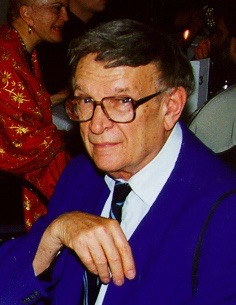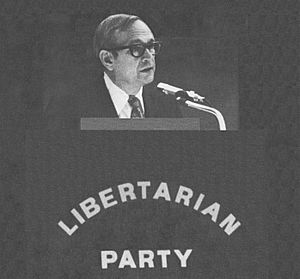John Hospers facts for kids
Quick facts for kids
John Hospers
|
|
|---|---|

Hospers in 1998
|
|
| Personal details | |
| Born | June 9, 1918 Pella, Iowa, U.S. |
| Died | June 12, 2011 (aged 93) Los Angeles, California, U.S. |
| Political party | Libertarian |
| Alma mater | Central College, Iowa University of Iowa Columbia University |
John Hospers (born June 9, 1918 – died June 12, 2011) was an American philosopher and someone who worked to change politics. He was interested in a way of thinking called Objectivism. He was also a friend of the famous writer and philosopher Ayn Rand for a while. In 1972, John Hospers became the very first person to run for president for the Libertarian Party. He was the only candidate from a smaller party to get an electoral vote in that year's U.S. presidential election.
Contents
John Hospers' Early Life and Education
John Hospers was born on June 9, 1918, in Pella, Iowa. He went to Central College and finished his studies there in 1939.
He then continued his education at the University of Iowa, earning a master's degree in English in 1942. Later, he earned a PhD in philosophy from Columbia University in 1946.
Hospers' Career as a Philosopher
After his studies, John Hospers became a professor. He taught philosophy at several universities. These included the University of Minnesota and Brooklyn College.
He also taught at California State College Los Angeles. For many years, he was the head of the philosophy department at the University of Southern California. He later became a professor emeritus there, which means he retired but kept his title.
John Hospers studied and wrote about different areas of philosophy. These included aesthetics, which is the study of beauty and art. He also focused on ethics, which is the study of what is right and wrong.
In 2002, a video was made about John Hospers' life and ideas. It was part of a series called Classics of Liberty.
John Hospers' Friendship with Ayn Rand
While teaching at Brooklyn College, John Hospers became very interested in Objectivism. This was a philosophy developed by Ayn Rand. He even appeared on radio shows with her.
Hospers also wrote a lot about Rand's ideas in his ethics textbook, Human Conduct. According to Rand's biographer, Barbara Branden, they became friends after meeting at Brooklyn College. They had many deep talks about philosophy.
Their discussions even helped Rand decide to write nonfiction books. Hospers read Rand's famous novel, Atlas Shrugged, and thought it was a great work of art.
Disagreements Between Hospers and Rand
Even though Hospers agreed with Rand on many ideas about morals and politics, they had some disagreements. They disagreed about epistemology, which is the study of how we know things. They wrote many letters to each other about this topic.
They also disagreed about free will. Hospers believed in determinism, meaning everything is already decided. Rand, however, believed people have true free will.
Another disagreement was about conscription, which is when people are required to join the military. Hospers supported it, but Rand was against it. Their friendship ended after Hospers critiqued one of Rand's talks. She felt he had criticized her speech on "Art and Sense of Life" at Harvard.
John Hospers' 1972 Presidential Campaign
In the 1972 U.S. Presidential election, John Hospers made history. He and Tonie Nathan were the first people to run for president and vice-president for the new Libertarian Party.
The Libertarian Party was very new at the time. Because of this, Hospers and Nathan were only able to get on the ballot in two states. These states were Washington and Colorado. They received 3,674 popular votes in total.
Even with few votes, Hospers and Nathan received one electoral vote. This vote came from Roger MacBride, a Republican from Virginia. MacBride was a "faithless elector," meaning he voted differently from his state's popular vote.
Because of this, Tonie Nathan became the first woman and the first Jewish person to receive an electoral vote in a U.S. presidential election.
Books Written by John Hospers
John Hospers wrote many books during his career. Some of his well-known works include:
- Meaning and Truth in the Arts (1946)
- Introductory Readings in Aesthetics (1969)
- Artistic Expression (1971)
- Libertarianism – A Political Philosophy for Tomorrow (1971)
- Understanding the Arts (1982)
- Law and the Market (1985)
- Human Conduct (first published in 1995, now in its 3rd edition)
- An Introduction to Philosophical Analysis (first published in 1996, now in its 4th edition)
He also edited three collections of writings by other authors. He wrote more than 100 articles for different academic and popular magazines. Hospers was also an editor for several important journals, including The Personalist and The Monist. He was also a senior editor at Liberty magazine.
See also
 In Spanish: John Hospers para niños
In Spanish: John Hospers para niños
- American philosophy
- Libertarianism in the United States
- List of American philosophers
 | Stephanie Wilson |
 | Charles Bolden |
 | Ronald McNair |
 | Frederick D. Gregory |


